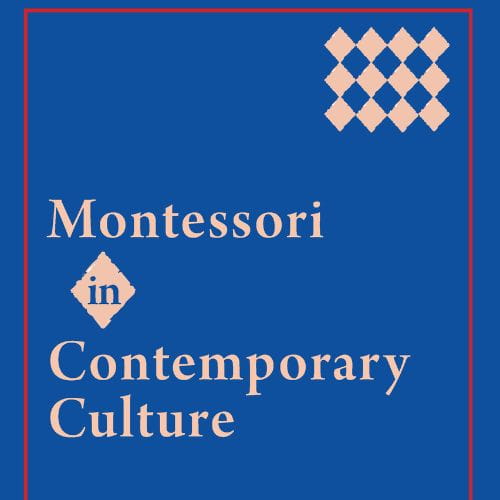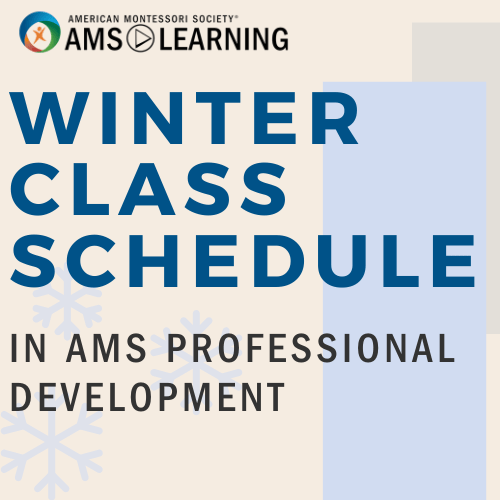Statement on AI and Technology: An Open Letter to the Global Montessori Community from the AMS Innovation Fellowship Think Tank

Dear Members of the Global Montessori Community,
As members of the AMS Innovation Think Tank Fellowship, we have dedicated the better part of two years exploring how technology, and specifically, artificial intelligence, impacts our Montessori community. Our research consistently shows that the Montessori Method is already paving the way for our children to thrive in the age of artificial intelligence. By encouraging exploration, independence, and deep engagement with materials, Montessori education nurtures the very skills that AI demands. When children work with activities like pouring, threading, and sorting, they are not just developing fine motor skills, they are building the logical thinking needed for coding and algorithms. The sensorial experiences central to Montessori lay the foundation for understanding complex AI concepts like pattern recognition and data analysis. As students grow, their work with interdisciplinary materials such as geometric solids and mathematical tools, seamlessly connects to the spatial reasoning and critical thinking required in AI fields.
Montessori teachers are already fostering a generation of thinkers, problem-solvers, and innovators who will not only navigate the AI-driven world but will also lead and shape it. This is where Montessori's timeless principles meet the future, ensuring our students are empowered to be creators and ethical leaders in a rapidly evolving technological landscape.
Technology as Peace Education
Peace Education is a central tenet of the Montessori curriculum, and it offers an ideal context for introducing some aspects of tech education, particularly Digital Citizenship. Dr. Maria Montessori recognized the lack of internal and social growth amid an advancing world, including technological advancements, when she wrote:
"...the development of man himself has not kept pace with that of his external environment. Society has not only developed into a state of utmost complication and extreme contrasts, but it has now come to a crisis in which the peace of the world and civilization itself are threatened." (Montessori, M. (1976). From Childhood to Adolescence. Schocken Books. p. 59)
Moving forward, it is essential to nurture inner peace within ourselves and among humanity, ensuring that technological advancements serve, rather than harm, our world. Children and adolescents should learn to connect appropriate technology use with peace
Technology as Practical Life
In the Montessori classroom, technology can be introduced as one of many tools integrated into the practical life area to support learning and development. It does not overshadow hands-on experiences but complements them, offering new ways for children to engage with information and express their creativity. Dr. Montessori advocated designing Practical Life exercises to help children adapt to their times. Exercises and activities that incorporate digital literacy and responsible technology use, as modeled by adults who support Montessori’s vision, can enhance the evolution of peace education in this digital era.
Computational Thinking
An essential skill for the future, computational thinking involves solving problems, designing systems, and understanding human behavior by drawing on concepts fundamental to computer science. It is crucial to incorporate these skills into our curriculum, helping children to break down complex problems into manageable parts, recognize patterns, and develop step-by-step solutions (Computational Thinking by Michelle Velho).
Empowering Children with Knowledge and Agency
Central to our mission is empowering children to be active participants in their own education. In an increasingly AI-driven world, this means teaching children about the ethical use of technology, data privacy, and the societal impacts of AI through programs like Common Sense Media and ISTE Digital Citizenship. Students will learn to use technology responsibly, developing critical thinking skills that enable them to navigate and shape their world.
Equity and Inclusion
Inspired by the American Montessori Society’s Anti-Bias Anti-Racist (ABAR) work and Ulcca Joshi Hansen’s approach in “The Future of Smart,” we are dedicated to creating a learning environment that is fair and welcoming to all. In the context of technology and AI, we celebrate diversity by addressing AI biases and ensuring equitable access to digital resources. We incorporate culturally responsive teaching, provide professional development on AI ethics, and actively engage families and communities. Regular policy reviews help mitigate AI biases and promote equity, creating a safe, welcoming space where every child can thrive in a technologically advanced world.
Technology and AI Policies
Incorporating technology and AI into our educational framework requires thoughtful consideration and adherence to Montessori principles. It is vital that every school has a thorough Technology and Artificial Intelligence Policy and student agreement in their school handbook. Every member of staff, parent, and student, has a clear understanding of what is and is not allowed with regard to technologies.
Key Areas to Include:
- Balanced Integration: Technology complements hands-on learning, and enhances traditional Montessori activities without replacing them.
- Ethical Use and Digital Citizenship: Children and adolescents learn about the ethical use of technology, digital citizenship, and maintain a healthy balance between screen time and offline activities.
- Skills Development: AI and technology education develops future-critical skills, including programming basics, problem-solving with digital tools, and understanding AI concepts.
- Teacher Training: Educators receive ongoing training to stay updated on educational technologies and integrate digital tools effectively.
- Parental Involvement: Parents are engaged through resources and workshops to support their children's digital literacy and responsible technology use at home.
- Continuous Evaluation: Regular evaluation ensures technology integration aligns with Montessori principles and supports educational goals, with feedback from the community guiding adjustments.
- Centering Youth Voices: In alignment with Montessori philosophy, children’s and adolescents’ opinions, knowledge, and wisdom are sought, listened to, and given central importance when decisions about tech use in their schools and classrooms that affect their lives and education are being made by the adults with decision-making power.
Collaboration with the Global Education Community
The American Montessori Society (AMS) is committed to strictly adhering to Montessori principles. We believe that these principles, grounded in careful observation and respect for the child, are universal and timeless.
In these transitional and challenging times, it is essential to foster unity rather than division within the global educational community. Our shared goal is the well-being and holistic development of children. By working together and learning from one another, we can collectively enrich our practices and truly serve today’s children.
Supporting Research and Data
According to the World Economic Forum’s Future of Jobs Report, 50% of all employees will need reskilling by 2025, as the adoption of technology increases. Critical thinking and problem-solving top the list of skills that employers believe will grow in prominence in the coming years. Additionally, the report emphasizes the importance of self-management skills, such as active learning, resilience, stress tolerance, and flexibility.
The Partnership for 21st Century Learning highlights the need for students to develop skills in four key areas: critical thinking, communication, collaboration, and creativity. These skills are essential for success in an increasingly complex and interconnected world.
The 2024 EDUCAUSE Horizon Report envisions several future scenarios for teaching and learning, highlighting the transformative potential of AI and digital tools in education. Research from the Institute for the Future predicts that 85% of the jobs that will exist in 2030 have not been invented yet. This underscores the importance of fostering adaptable, lifelong learners who can navigate and shape the future landscape.
The 2024 National Educational Technology Plan (NETP) by the U.S. Department of Education outlines key strategies for closing the digital divide and ensuring equitable access to technology. It emphasizes the need for educators to design active learning experiences that engage and inspire students while addressing critical issues such as digital literacy and citizenship.
The Catalysing Education 4.0 report from the World Economic Forum emphasizes the importance of investing in education to prepare for a human-centric recovery. It highlights skills such as global citizenship, innovation, creativity, technology proficiency, and lifelong learning as essential for future success.
The NAEYC position statement on the use of technology and interactive media in early childhood programs provides guidelines on how to use these tools effectively to support learning and development for children from birth through age 8.
Reassuring Our Community
To our Global Montessori community, we want to invite you to consider how we can continue to profoundly serve our children in the age of AI with the tools and materials that Dr. Maria Montessori has already given us. Our environments continue to be rich with hands-on materials, nature-based activities, and opportunities for independent exploration.
However, we also recognize the importance of evolving with the times. Just as Dr. Montessori herself was a pioneer in incorporating scientific principles into education, we too can explore the integration of technology in a way that respects and enhances our foundational principles. By doing so, we can equip our children with the knowledge and agency to thrive in an ever-evolving world.
A Call to Consider
We invite you to join us in this exciting journey of reviewing the old with the new. Let us continue to uphold the integrity of Montessori education while considering the advancements of our time. Together, we can create learning environments that honor our rich heritage and confidently prepare our children for the future.
"An education capable of saving humanity is no small undertaking: it involves the spiritual development of man, the enhancement of his value as an individual, and the preparation of young people to understand the times in which they live." Montessori, M. (1949). Education and Peace. Clio Press.
Thank you for your unwavering commitment to Montessori education and for your support as we navigate this dynamic landscape. Let us move forward with confidence, knowing that we are providing our children with an education that is both timeless and timely.
With respect,
Innovation Fellowship Think Tank | Cohort #2 2024-2025
American Montessori Society | amsiftttech@gmail.com
Interested in hearing more from the group on this topic? Join our upcoming AMS Tech Talk Live update on the Think Tank Technology Group's work on Digital Citizenship and Mapping Montessori Materials with AI on Monday, November 4, at 7:00 PM (ET).
References
World Economic Forum. (2020). Jobs and the Future of Work Report.
Partnership for 21st Century Learning. (2020). Framework for 21st Century Learning.
Institute for the Future. (2017). The Next Era of Human-Machine Partnerships.
U.S. Department of Education. 2024 National Educational Technology Plan.
EDUCAUSE. (2024). EDUCAUSE Horizon Report: Teaching and Learning Edition.
World Economic Forum. (2022). Catalysing Education 4.0.
NAEYC. Technology and Interactive Media as Tools in Early Childhood Programs.
Disclosure Statement:
The work presented in this open letter has been developed by the second cohort of the American Montessori Society Innovation Fellowship Think Tank. This group, composed of passionate Montessori educators and innovators, meets monthly and dedicates 5 to 10 hours each month to researching and exploring how Montessori education can integrate with technological advancements.
The ideas shared here are offered humbly as possible considerations for the global Montessori community and are not intended as formal recommendations or directives. They reflect the collective explorations and insights of the Think Tank members, and do not represent the official views or positions of the American Montessori Society (AMS).
We wish to disclose that some members of our group have professional associations with the companies mentioned in this letter. These relationships include, but are not limited to, employment, consultancy, advisory roles, or ownership of shares. Our commitment to transparency and integrity requires that we openly share these connections. While these associations may influence our perspectives, we assure you that our primary focus remains the best interests of the community and the goals outlined in this letter.
Dr. Maria Montessori was a visionary, an innovator, and an activist. In that spirit, this letter seeks to suggest thoughtful ways in which Montessori education can continue to evolve in the age of AI, while maintaining deep respect for Montessori’s core principles.
All discussions, decisions, and adaptations related to the ideas presented here are left to the discretion of individual Montessori educators and communities around the world.
Interested in writing a guest post for our blog?
Let us knowThe opinions expressed in Montessori Life are those of the authors and do not necessarily represent the position of AMS.
















